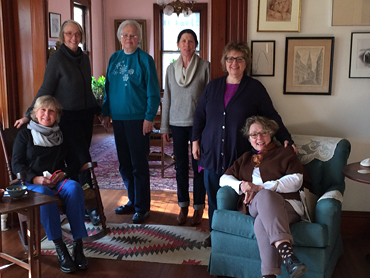
The DFW “Salon”: An Alternative Chapter Model
By Leslye Heilig, Co-Leader, Northeast Region and Chapter Leader of MA, Great Barrington-1 and 2
For the past four years, I have been the Chapter Leader of a large, successful potluck dinner-based chapter, with approximately 25 to 50 members attending each month. This past spring, at the request of some members who did not feel comfortable driving in rural areas at night and who were looking for a more intimate and in-depth discussion, I started a daytime chapter. I continue to lead both chapters, and thoroughly enjoy each of them for their very different yet equally wonderful aspects.
My daytime chapter membership is much smaller, and the members are committed to one-on-one discussion and building relationships within the group. For convenience we have chosen to meet at the same home each month. Although it is neither potluck nor meal-based, we generally have tea and light snacks. Members do not prepare a dish to share, although on occasion someone independently decides to do that (in January it was amaranth carrot bread). The average donation is comparable to the evening potluck dinner model.
Usually there are 5 to 10 of us present. This model most resembles a “salon”. (Salons were an Italian invention: a gathering of people under the roof of an inspiring host held partly for the exchange of ideas, enjoyment of the group and to increase knowledge through conversation.)
It is the responsibility of each member to read the information about the featured and sustained grantees and watch the videos prior to meeting. Our Chapter Co-Leader usually begins the conversation by providing an historical, geographic, political and cultural context for the country being discussed. Because of the professional experience of our members we are learning about the NGO (non-governmental organization) world and how to view the DFW grantees through an informed critical lens. We discuss the issues being addressed by the grant — education, maternal health, economic empowerment, etc. — and oftentimes migrate into related human rights/women’s rights topics. We educate each other based on our particular experiences and the different lenses through which we see the grantees (we come from a multitude of backgrounds which enriches the discussion).
We did not begin as a group of friends — most of us did not even know each other. Our heterogeneity has added to our experience. Meetings last 2 hours, and this has been enough time for us to both get to know each other better as well as delve into topics raised by the grants. Although we have been meeting for less than a year, I suspect that this “salon” will continue. Occasionally, one of us brings another interested person, but we do not expect to be an “open” group. We have chosen to do this in order to build on our prior conversations.
For those of you looking for a slightly different experience of DFW, this “salon” model might be an option. Given the backgrounds, needs, and interests of your members, the character of your DFW Salon may be quite different than ours. Let us know about yours.
The DFW Salon … another way to change the world for women and girls, not always one dinner at a time.
